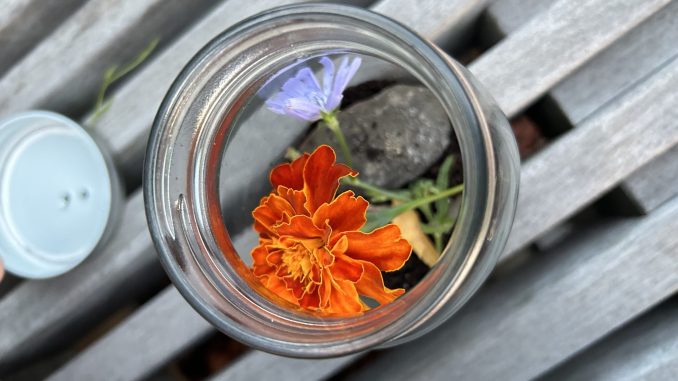
It was an evening of sustainable education, strolling through nature and collecting acorns.
On Sept. 18 at 6:30 p.m. in front of Old Main, in collaboration with the New Paltz Environmental Alliance (Eco Allies for short), Aspiring Educators held their second event of the semester — making Eco-Jars. Over 20 people attended, some bringing their own mason jars, others given a jar equipped with rocks and potting soil.
Third-year early childhood education major and vice president of Aspiring Educators, Allison Reitz, bore the brunt of the sustainable education part, opening the night with a three-minute introduction to the purpose of the event.
“For some reason, sustainability is political, like politicized, and it should not be. It is not an issue of this or that — it is an issue of preserving the human race. And if anybody doesn’t want to see that, then they’re silly,” she said. Reitz discussed how sustainability and education is an important intersection for her, later mentioning educator-specific resources for teaching sustainability in classrooms of all ages as well as distributing a handmade, eight-page zine. The zine contained six tips on incorporating sustainable practices in the classroom. Being the Aspiring Educators, the events and work that they do always have an educator-focus in mind.
Walking across campus, participants were encouraged to collect items that spoke to them. Some gathered grass clippings, fallen leaves and small flowers, while others gathered acorns, twigs and dried moss. Reitz later explained that an eco-jar was “a mini ecosystem in a jar,” meant to self-sustain life, with a slight possibility of bugs being included. To complete the miniature terrarium, water from the Gunk was poured in and the jars were sealed.
Eco-jars are just one of many ways of combining sustainability and art. Reitz expressed that “[Art] is a good medium that presents a lot of information without a lot of words,” pointing out the inaccessibility of long, academic research papers compared to making something that expresses one’s understanding of Earth. Eco-jars can be a tool used to explore sustainable practices and to “Put a lot more emotion into it.”
Along with being an education major, Reitz is a sustainability ambassador, meaning she understands the current climate around climate change in schools. While acknowledging the politicism of this discussion, she stated, “If you’re going to be a teacher, you are going to inevitably step on some toes. And I think preserving a planet and making sure you’re educating the youth to the best of their ability outweighs a parent complaint.”
As the night closed out and everyone got to bring home their own piece of eco-art, Reitz wanted SUNY New Paltz students to know that individual actions do impact the environment and that if they were feeling discouraged about meaningful sustainable action, “Don’t give up and just keep persevering and advocating and using your voice, because nothing is going to get fixed if nobody wants to say anything.”
The Aspiring Educators will continue to hold meetings and events on a bi-weekly basis, their next one being on Oct. 2 at 6:30 p.m. in the Old Main CMC 215.
